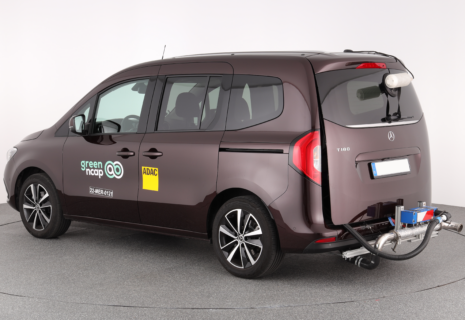Mercedes-Benz T-Class T180 96kW petrol FWD automatic
2022
42%
7.6
10
Clean Air Index
3.3
10
Energy Efficiency Index
1.7
10
Greenhouse Gas Index
| Laboratory Tests | NMHC | NOX | NH3 | CO | PN | |
|---|---|---|---|---|---|---|
| 7.210 | Cold Test | |||||
| 8.810 | Warm Test | |||||
| 6.810 | Highway | |||||
| Cold Ambient Test | Does not qualify for additional robustness testing | |||||
| Road Test | ||||||
| 8.010 | On-Road Drive | |||||
| 3.35 | On-Road Short Trip | |||||
| On-Road Heavy Load | Does not qualify for additional robustness testing | |||||
| On-Road Light Load | Does not qualify for additional robustness testing | |||||
| Congestion | Does not qualify for additional robustness testing | |||||
| Laboratory Tests | Energy | |||
|---|---|---|---|---|
| 4.410 | Cold Test | |||
| 4.310 | Warm Test | |||
| 1.510 | Highway | |||
| Cold Ambient Test | Does not qualify for additional robustness testing | |||
| Consumption | Driving Range | |||
| Average | 7.7l100 km | 718km | ||
| Worst-Case | 9.2l100 km | 586km | ||
| Greenhouse Gases | CO2 | N2O | CH4 | |
|---|---|---|---|---|
| 2.710 | Cold Test | |||
| 2.610 | Warm Test | |||
| 0.010 | Highway | |||
| Cold Ambient Test | Does not qualify for additional robustness testing | |||
Specifications
- Tested Car W1V4208631U31XXXX
- Publication Date 12 2022
- Vehicle Class Small MPV
- Emissions Class Euro 6d AP
- Tyres 205/55 R17
- Mass 1,580 kg
- Engine Size 1,332 cc
- Power/Torque 96 kW/240 Nm
- Declared CO2 155 g/km
- Declared Consumption 6.8 l/100 km







































































































































Our verdict
August 2023: The result of this car been updated. Previously reported Ammonia (NH3) values were incorrect owing to a technical error with the equipment at the test laboratory and a correction has been applied.
Tested here is the Mercedes-Benz T-Class with a 1.3 l, 96 kW petrol engine. The engine comes from Renault and can be found in the Kangoo, which was tested by Green NCAP in June 2022. The T-Class is a multipurpose utility vehicle and its body is comparable to the VW Caddy and the Kangoo, both of which lost points in the Energy Efficiency Index due to relatively high fuel consumption. In general, around 7 l/100 km can be expected, which matches well with the declared figure. On the Highway, the number rises above 9 l/100 km, but for a standard real-world trip, around 6.5 l/100 km should be sufficient. Closely related to the consumption is the amount of emitted CO2 and here T-Class receives only 1.7 points, despite the bonus points granted for excellent methane and laughing gas control. The strong point of the car is the Clean Air Index, where it demonstrates high performance to reduce its polluting gases. The results are creditable, with minor deductions for particles and ammonia emissions. Thanks to that index, the Mercedes-Benz T180 comes out with a Weighted Overall Index of 4.2 and 2½ Green stars.